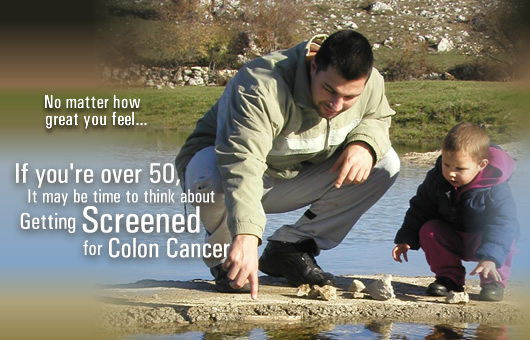Frequently asked Questions and Answers about Colonoscopy
Q: What is a Colonoscopy?
A colonoscopy is an exam that allows a doctor to see and closely inspect the inside of the entire colon for signs of cancer or polyps. Polyps are small growths that can eventually become cancerous. The doctor uses a slender, flexible, hollow, lighted tube about the thickness of a finger. This "colonoscope" is gently eased inside the colon and has a tiny video camera, which sends pictures to a TV monitor. Small puffs of air are introduced into the colon to keep it open and allow the doctor to see clearly.
The exam itself typically takes 10–15 minutes. Patients are usually given medicine to help them relax, which often puts them to sleep during the procedure. Your doctor decides how often you need this test, depending on your personal risk for colon cancer.
Q: Will it hurt?
A: No, this procedure is not painful. Patients are provided a sedative for the colonoscopy, so they won't feel anything. Some patients find the air pressure to be somewhat uncomfortable. Air is pumped into the cleaned-out colon so it will hold its normal size and doctors can get the best pictures. It may be slightly uncomfortable, but it should not hurt. Some studies show that most patients found the anticipation was worse than the exam itself.
Q: Who will do the exam?
A: A colonoscopy is always done by a physician, usually a gastroenterologist or a surgeon.
Q: Will I be in a private room?
A: The Colonoscopy is performed in a private procedure room. The patient's privacy is a top concern.
Q: How do I prepare? Will I need to miss work?
A: The preparation for the colonoscopy requires you to go the bathroom a lot! You follow a special diet the day before the exam and take a very strong laxative in the hours before the procedure. The key to getting good pictures is to have the colon cleaned out. Because colonoscopy is usually done under sedation, people typically will miss a day of work. You'll need to stay close to a bathroom.
Q: How will I feel afterward? Will I need someone to drive me home?
A: Most people feel OK after a colonoscopy. They may feel a bit woozy. They'll be watched and given fluids after the procedure as they awaken from the anesthesia. They may have some gas, which could cause mild discomfort. Because of the sedation that is given for the test, we ask that you bring someone to take you home.
Q: What if they find something?
A: If a small polyp is found, your doctor will probably remove it because it could eventually become cancerous. If your doctor sees a large polyp, a tumor, or anything else abnormal, a biopsy will be done. For the biopsy, a small piece of tissue is taken out through the colonoscope and it's sent to a lab to be checked under a microscope for cancerous or precancerous cells.
Q: Why are these tests so important?
A: Removing polyps prevents colorectal cancer from ever starting. And cancers found in an early stage are more easily treated. But too often people don't get these tests. Then the cancer can grow and spread unnoticed, like a silent invader. In many cases, by the time people experience any symptoms the cancer is very advanced and very difficult to treat.
 Procedure Instructions.
Procedure Instructions.

